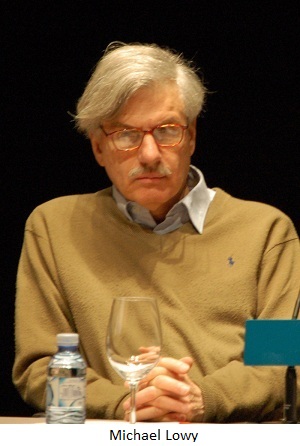AN ECOSOCIALIST MANIFESTO
- Ayrıntılar
- Üst Kategori: ROOT
- Kategori: Political Ecology
 The idea for this ecosocialist manifesto was jointly launched by Joel Kovel and Michael Lowy, at a September, 2001, workshop on ecology and socialism held at Vincennes, near Paris. We all suffer from a chronic case of Gramsci's paradox, of living in a time whose old order is dying (and taking civilization with it) while the new one does not seem able to be born. But at least it can be announced. The deepest shadow that hangs over us is neither terror, environmental collapse, nor global recession. It is the internalized fatalism that holds there is no possible alternative to capital’s world order. And so we wished to set an example of a kind of speech that deliberately negates the current mood of anxious compromise and passive acquiescence.
The idea for this ecosocialist manifesto was jointly launched by Joel Kovel and Michael Lowy, at a September, 2001, workshop on ecology and socialism held at Vincennes, near Paris. We all suffer from a chronic case of Gramsci's paradox, of living in a time whose old order is dying (and taking civilization with it) while the new one does not seem able to be born. But at least it can be announced. The deepest shadow that hangs over us is neither terror, environmental collapse, nor global recession. It is the internalized fatalism that holds there is no possible alternative to capital’s world order. And so we wished to set an example of a kind of speech that deliberately negates the current mood of anxious compromise and passive acquiescence.
This manifesto nevertheless lacks the audacity of that of 1848, for ecosocialism is not yet a spectre, nor is it grounded in any concrete party or movement. It is only a line of reasoning, based on a reading of the present crisis and the necessary conditions for overcoming it. We make no claims of omniscience. Far from it, our goal is to invite dialogue, debate, emendation, above all, a sense of how this notion can be further realized. Innumerable points of resistance arise spontaneously across the chaotic ecumene of global capital. Many are immanently ecosocialist in content. How can these be gathered? Can we envision an "ecosocialist international?" Can the spectre be brought into being?
Manifesto

The twenty-first century opens on a catastrophic note, with an unprecedented degree of ecological breakdown and a chaotic world order beset with terror and clusters of low-grade, disintegrative warfare that spread like gangrene across great swathes of the planet--viz., central Africa, the Middle East, Northwestern South America--and reverberate throughout the nations.
In our view, the crises of ecology and those of societal breakdown are profoundly interrelated and should be seen as different manifestations of the same structural forces. The former broadly stems from rampant industrialization that overwhelms the earth's capacity to buffer and contain ecological destabilization. The latter stems from the form of imperialism known as globalization, with its disintegrative effects on societies that stand in its path. Moreover, these underlying forces are essentially different aspects of the same drive, which must be identified as the central dynamic that moves the whole: the expansion of the world capitalist system.
We reject all euphemisms or propagandistic softening of the brutality of this regime: all greenwashing of its ecological costs, all mystification of the human costs under the names of democracy and human rights. We insist instead upon looking at capital from the standpoint of what it has really done.
Acting on nature and its ecological balance, the regime, with its imperative to constantly expand profitability, exposes ecosystems to destabilizing pollutants, fragments habitats that have evolved over aeons to allow the flourishing of organisms, squanders resources, and reduces the sensuous vitality of nature to the cold exchangeability required for the accumulation of capital.
From the side of humanity, with its requirements for self-determination, community, and a meaningful existence, capital reduces the majority of the world's people to a mere reservoir of labor power while discarding much of the remainder as useless nuisances. It has invaded and undermined the integrity of communities through its global mass culture of consumerism and depoliticization. It has expanded disparities in wealth and power to levels unprecedented in human history. It has worked hand in glove with a network of corrupt and subservient client states whose local elites carry out the work of repression while sparing the center of its opprobrium. And it has set going a network of transtatal organizations under the overall supervision of the Western powers and the superpower United States, to undermine the autonomy of the periphery and bind it into indebtedness while maintaining a huge military apparatus to enforce compliance to the capitalist center.
We believe that the present capitalist system cannot regulate, much less overcome, the crises it has set going. It cannot solve the ecological crisis because to do so requires setting limits upon accumulation—an unacceptable option for a system predicated upon the rule: Grow or Die! And it cannot solve the crisis posed by terror and other forms of violent rebellion because to do so would mean abandoning the logic of empire, which would impose unacceptable limits on growth and the whole “way of life” sustained by empire. Its only remaining option is to resort to brutal force, thereby increasing alienation and sowing the seed of further terrorism . . . and further counter-terrorism, evolving into a new and malignant variation of fascism.
In sum, the capitalist world system is historically bankrupt. It has become an empire unable to adapt, whose very gigantism exposes its underlying weakness. It is, in the language of ecology, profoundly unsustainable, and must be changed fundamentally, nay, replaced, if there is to be a future worth living.
Thus the stark choice once posed by Rosa Luxemburg returns: Socialism or Barbarism!, where the face of the latter now reflects the imprint of the intervening century and assumes the countenance of ecocatastrophe, terror counterterror, and their fascist degeneration.
But why socialism, why revive this word seemingly consigned to the rubbish-heap of history by the failings of its twentieth century interpretations? For this reason only: that however beaten down and unrealized, the notion of socialism still stands for the supersession of capital. If capital is to be overcome, a task now given the urgency of the survival of civilization itself, the outcome will perforce be “socialist,” for that is the term which signifies the breakthrough into a post-capitalist society. If we say that capital is radically unsustainable and breaks down into the barbarism outlined above, then we are also saying that we need to build a “socialism” capable of overcoming the crises capital has set going. And if “socialisms” past have failed to do so, then it is our obligation, if we choose against submitting to a barbarous end, to struggle for one that succeeds. And just as barbarism has changed in a manner reflective of the century since Luxemburg enunciated her fateful alternative, so too, must the name, and the reality, of a “socialism” become adequate for this time.
It is for these reasons that we choose to name our interpretation of “socialism” as an ecosocialism, and dedicate ourselves to its realization.
Why Ecosocialism?
We see ecosocialism not as the denial but as the realization of the “first-epoch” socialisms of the twentieth century, in the context of the ecological crisis. Like them, it builds on the insight that capital is objectified past labor, and grounds itself in the free development of all producers, or to use another way of saying this, an undoing of the separation of the producers from the means of production. We understand that this goal was not able to be implemented by first-epoch socialism, for reasons too complex to take up here, except to summarize as various effects of underdevelopment in the context of hostility by existing capitalist powers. This conjuncture had numerous deleterious effects on existing socialisms, chiefly, the denial of internal democracy along with an emulation of capitalist productivism, and led eventually to the collapse of these societies and the ruin of their natural environments.
The generalization of ecological production under socialist conditions can provide the ground for the overcoming of the present crises. A society of freely associated producers does not stop at its own democratization. It must, rather, insist on the freeing of all beings as its ground and goal. It overcomes thereby the imperialist impulse both subjectively and objectively. In realizing such a goal, it struggles to overcome all forms of domination, including, especially, those of gender and race. And it surpasses the conditions leading to fundamentalist distortions and their terrorist manifestions. In sum, a world society is posited in a degree of ecological harmony with nature unthinkable under present conditions. A practical outcome of these tendencies would be expressed, for example, in a withering away of the dependency upon fossil fuels integral to industrial capitalism. And this in turn can provide the material point of release of the lands subjugated by oil imperialism, while enabling the containment of global warming, along with other afflictions of the ecological crisis.
No one can read these prescriptions without thinking, first, of how many practical and theoretical questions they raise, and second and more dishearteningly, of how remote they are from the present configuration of the world, both as this is anchored in institutions and as it is registered in consciousness. We need not elaborate these points, which should be instantly recognizable to all. But we would insist that they be taken in their proper perspective. Our project is neither to lay out every step of this way nor to yield to the adversary because of the preponderance of power he holds. It is, rather, to develop the logic of a sufficient and necessary transformation of the current order, and to begin developing the intermediate steps towards this goal. We do so in order to think more deeply into these possibilities, and at the same moment, begin the work of drawing together with all those of like mind. If there is any merit in these arguments, then it must be the case that similar thoughts, and practices to realize these thoughts, will be coordinatively germinating at innumerable points around the world. Ecosocialism will be international, and universal, or it will be nothing. The crises of our time can—and must—be seen as revolutionary opportunities, which it is our obligation to affirm and bring into existence.
Ecosocialism retains the emancipatory goals of first-epoch socialism, and rejects both the attenuated, reformist aims of social democracy and the the productivist structures of the bureaucratic variations of socialism. It insists, rather, upon redefining both the path and the goal of socialist production in an ecological framework. It does so specifically in respect to the “limits on growth” essential for the sustainability of society. These are embraced, not however, in the sense of imposing scarcity, hardship and repression. The goal, rather, is a transformation of needs, and a profound shift toward the qualitative dimension and away from the quantitative. From the standpoint of commodity production, this translates into a valorization of use-values over exchange-values—a project of far-reaching significance grounded in immediate economic activity.
Joel Kovel and Michael Lowy
Paris, Sept 2001
http://www.cnsjournal.org/manifesto.html









